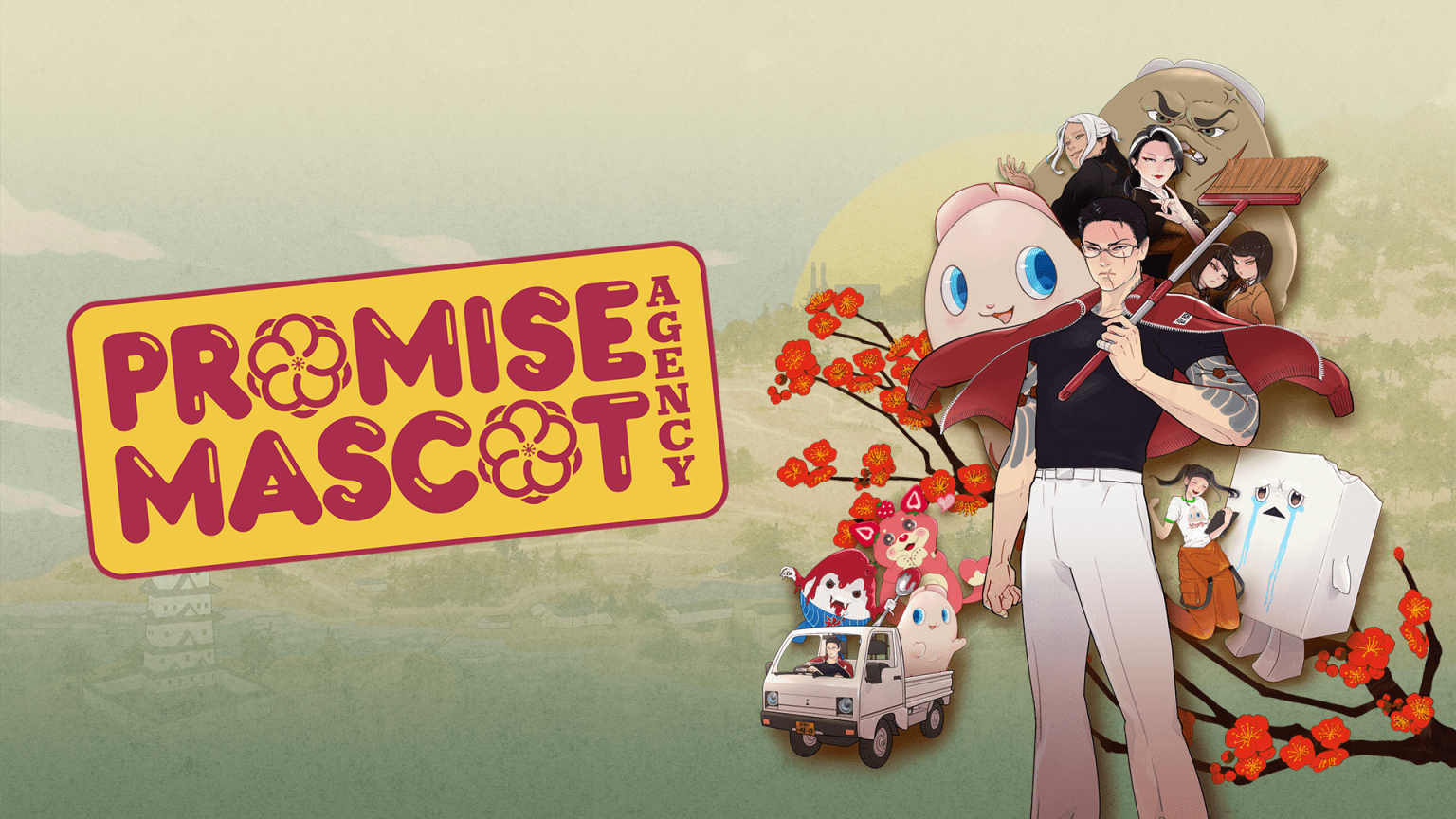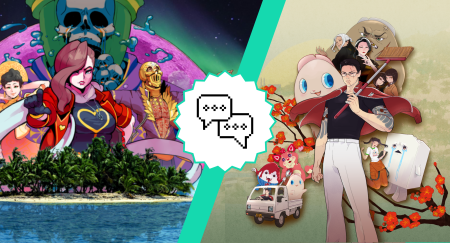At the start of the year, I shared that one of my most anticipated indie games of 2025 was Promise Mascot Agency, the second game by U.K.-based studio Kaizen Game Works. I was a huge fan of their murder mystery hit from 2020, Paradise Killer. These two titles have almost nothing in common except that they’re made by the same people and both are excellent.
In Paradise Killer, humanity’s darkness is the core of every conversation, investigation, and exploration. In Promise Mascot Agency, though, light is at the heart of everything you do.
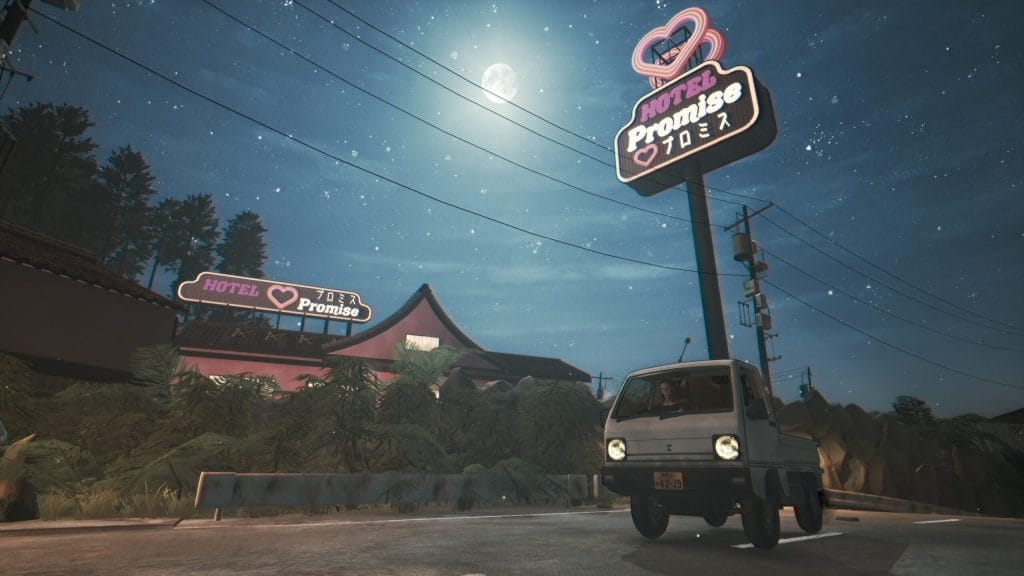
Meet Your Mascots
Promise Mascot Agency is a fun-loving management simulator with tons of heart. The story follows a disgraced Yakuza named Michi who’s been banished to a rural island town in Japan. Michi has to pay back his crime family for losing 12 billion yen in a gang war, and the family has put him in charge of running one of its less successful side businesses: a largely defunct mascot agency. Except in this fictional version of Japan, mascots are not costume-clad people; they’re real beings, including strawberry-farmer bears, tofu blocks that can’t stop sobbing, and purple bats in wilderness explorer outfits.
Michi’s new sidekick is a severed pinkie finger, the rambunctious and foul-mouthed Pinky. Pinky has angered the corrupt mayor of her hometown, Kaso-Machi, and has no patience for Michi’s city-cool energy. Over the course of the game, the pair’s working relationship and friendship blossoms, allowing players to lead the Promise Mascot Agency from the joke of the island to its pride.
Promise Mascot Agency consists of several different management systems. I usually struggle to follow rules, yet I never found any of the game’s mini-games or management screens to be overwhelming. About half the experience is driving (you never control Michi walking around; more on the truck in a moment), and the other half is managing the inner-workings of the agency.
A Finely Tuned Machine
The game is divided into four acts. These acts serve not just as distinct story segments but also as unique chapters from a gameplay perspective. It’s not that the core mechanics change per se, but rather that the business’s needs are constantly evolving. In the early game, you’re desperate to recruit enough mascots and secure enough gigs. By the mid-game, you must balance earning money with making key upgrades.
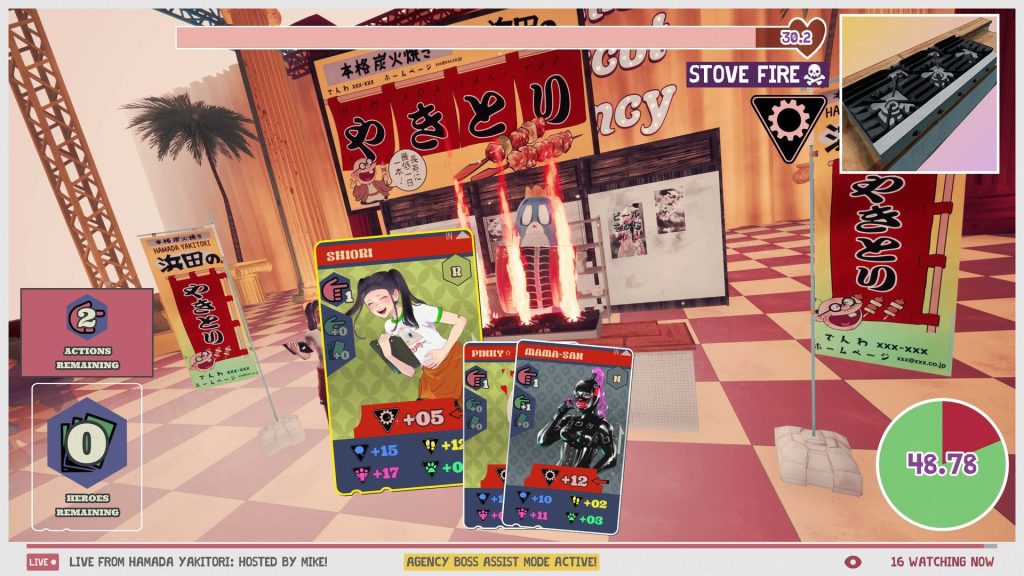
Players have to find, meet, and recruit mascots, then assign them to gigs and even help them when they’re on the job. You’ll get a call when a mascot has bungled a job—like struggling to walk through a normal-sized door or knocking over a poorly made stand. You help out by way of a fun little card game, which uses “heroes” recruited from the island to encourage your mascot. You’ll also use an arcade-inspired crane game to select mascot merchandise and ship it around the island.
These mini-games and systems are mostly fun (though they do get a little repetitive), and none of them feel forced or out of place. The game overall is quite self-directed, even giving the players the choice to determine when they get new quests from Pinky. Promise Mascot Agency is exceptionally well-paced, and so when the game stumbles a bit, it’s noticeable.
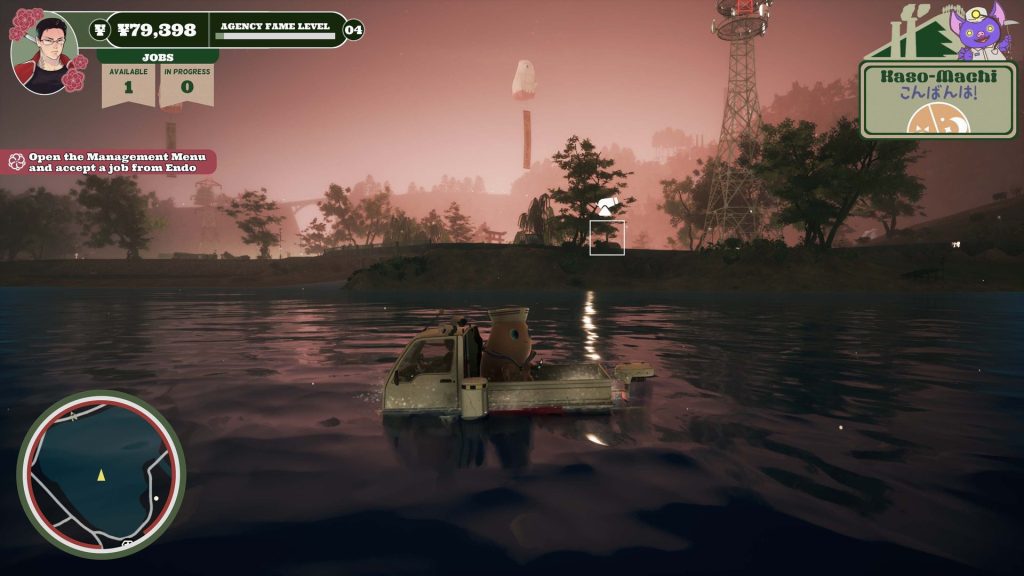
Get in, We’re Going Gliding
Driving around the down-on-its-luck island town of Kaso-Machi makes up about half the gameplay in Promise Mascot Agency. It makes sense that in my interview with Kaizen Game Works, the developers talked about how much time they spent trying to make the K-truck fun to drive.
Driving in Promise Mascot Agency caused me the most annoyance while playing. Having to do a seven-point turn in a cluttered apartment block felt all too similar to real life. I often didn’t understand the logic behind the game’s destructible roadsides; I’d frequently drive through trees only to smash into a light post. However, the truck also gave me some of my most genuine LOL-moments as I hit, say, one of those light posts, causing me to accidentally careen off a cliff, tumble comically far through the air, knock into a radio tower, drop down onto another truck below… only to drive off without a scratch.
The result is that exploring Kaso-Machi feels like a mix of many of your favorite games. There’s the open design of Breath of the Wild (you can drive up anything), the chaotic energy of the Mako in Mass Effect or the Warthog in Halo, plus the pseudo-invincibility of Apex Legends. The K-truck can be updated over the course of Promise Mascot Agency, with the highlights enabling Michi to shoot Pinky like a cannon out of the truckbed and even glide over the island’s mountains.

I got better at driving the more I played. I reviewed the game on PlayStation 5, and the DualSense controller was satisfying to drive with. Based on my experience, though, I imagine it’d be hard to play this game with a mouse and keyboard. It’s worth noting that I didn’t encounter a single bug while driving, which surprised me given how many absurd places I was able to force the K-truck.
I binged Promise Mascot Agency over a few days and felt happily cocooned in this pastel, quirky world where I felt I could really make a difference.
Kaso-Machi is a large island. Despite its scale, players can easily track their progress via a simple map. Promise Mascot Agency is deeply rooted in collectibles, something that normally annoys me. But finding these items in this game was largely straightforward and breezy. Some of the activities do get to be a bit of a grind, however. For example, cleaning up shrines around the map leads to the same animation every time. Just as I was starting to get really fed up with driving around Kaso-Machi, though, I’d find an upgrade that made things better—such as the ability to fast-travel later in the game.
By late game, though, the map’s design can be a little frustrating. There’s one quest where the icons are stacked so tightly on top of other icons that it’s hard to see, and one with no icons or indicators whatsoever that I eventually gave up on, as it was too hard to find the items amid the sprawling map. These blemishes are a shame, as this is one of the rare games I’ve considered trying to 100%, and that all has to do with the characters.
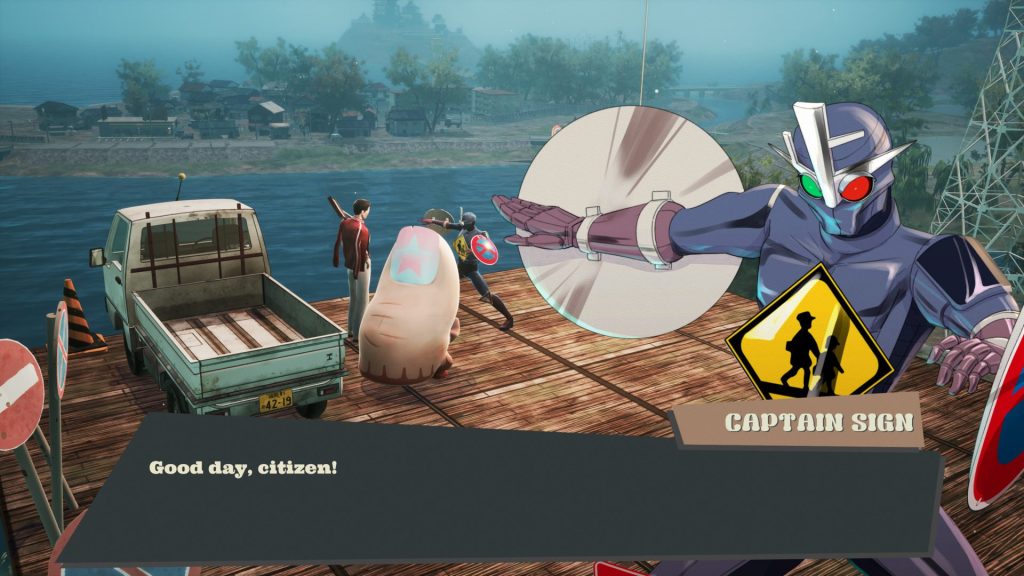
The Friends You Make
Over the course of the game, you’ll get collectible-based side quests to help out the local townspeople of Kaso-Machi. By investing in your employees and keeping them happy, you can also have Life Satisfaction Check-in Meetings which reveal sweet cut-scene conversations and unlock improved stats for your mascots. Chats with both your neighbors, who can become Mascot Heroes (aka cheerleaders), and mascots were my favorite part of the game.
There’s the train station master who grew admiring his father doing the same job, loving the comings and goings. But when the mayor shut down all trains (to line his own greedy pockets!), he killed the island’s tourism and trade industries. The train station master still goes to the space to keep it clean and tidy, awaiting the day when some day, visitors could come again. In the meantime, he cooks homemade lunches (that he’s happy to share with you) and takes care of a street cat—she’s had kittens, and they’re lost over the island! Michi, will you go find them? Um, HELL YEAH I WILL!
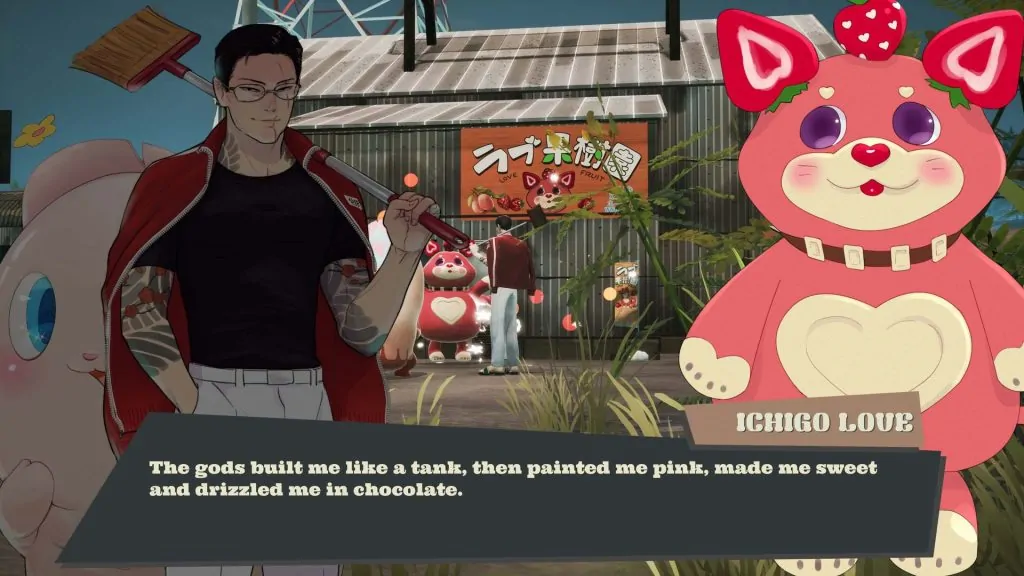
Within the agency itself, there’s over a dozen mascots to meet and nurture. There’s a soft-boiled egg mascot who wants to save the hot springs he was born in. There’s a peaceful spirit idol who just wants to teach visitors about the island’s history. And of course, there’s Promise Mascot Agency‘s flagship first employee—To-Fu, the crying block with legs that is desperate to find purpose in his tear-lined appearance.
All of the aspiring mascots and neighbors that Michi meets are worthy, despite not having received many chances (or second chances). I fell in love with Kaso-Machi, and I was rooting for all of my new friends, colleagues, and employees. Michi has the power to really improve Kaso-Machi, and it’s a joy to see (and hear!) this impact made tangible via decorations, enhancements, and signage representing the island’s various townspeople.
Greetings From Kaso-Machi!
The vibes in Kaso-Machi are great. I appreciate how much care and effort the team took to include Japanese developers in their work. (Look no further than the game’s all-star voice cast.) This game is a love letter to Japan. When making culture- and country-inspired art, I find it’s particularly important to actually include people from those places in the journey—not just so that the work is authentic, but so that the people being featured can be rewarded and paid and grow as a result of the project.
Promise Mascot Agency achieves in both visuals and sounds. The game is almost fully voiced in Japanese, which added personality to each character, even if I had to read the English subtitles to follow along. The music is lo-fi and luscious, composed by Alpha Chrome Yaye. The character art is sweet, crisp, and clear, even if it’s sometimes less inspired than the portraits in Paradise Killer.
This game is also all-around funnier than its predecessor. I laughed out loud at both conversations and my truck accidents. The game’s heart plus humor is key when the game approaches some of its raunchier topics (like porn) or grosser mascot designs (there’s one sad fellow whose innards are showing). For example, a BDSM bar owner reflects about how proud he is to accept himself for who he is. While nothing in the game is that bad, it definitely earns its Mature ESRB rating.
In Kaizen’s 2020 Paradise Killer, humanity’s darkness is the core of every conversation, investigation, and exploration. In Promise Mascot Agency, though, light is at the heart of everything you do.
It’s worth noting that I felt the final hours of the game struggled a bit. The late-game plot was somewhat rushed and burdened by too much expository dialogue. Gameplay-wise, I think I earned a lot of money quicker than the developers thought I would, which caused one or two plot-points to feel a bit lackluster. I also ran out of things to spend cash on fairly early in the game, which was fine but a little disappointing. I would’ve liked more cosmetic upgrades to purchase, but this also feels like a game that’s ripe for DLC or updates, so perhaps I’ll be revisiting the agency sooner than later. Ultimately, however, I had a fabulous time and was engaged throughout my 20-hour playthrough.
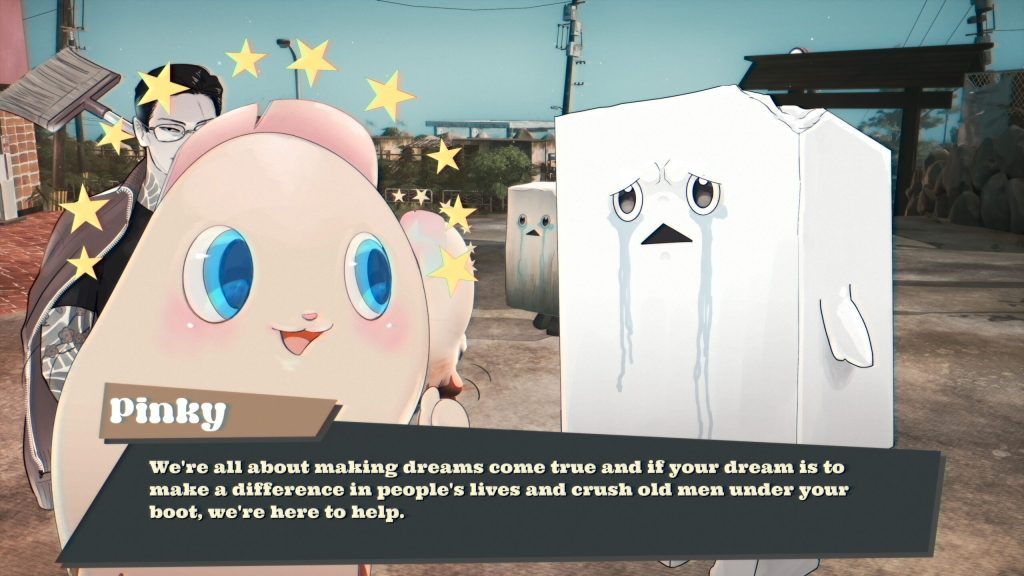
Final Thoughts
Even with the hiccups, I still strongly recommend this game. I binged Promise Mascot Agency over a few days and felt happily cocooned in this pastel, quirky world where I felt I could really make a difference.
After interviewing the Kaizen co-leads last month, I figured I would like their sophomore game well enough. I don’t think I expected to love it as much as I did. Furthermore, rarely do I play a video game where I think there’s a little something for almost everyone.
Promise Mascot Agency is a delightful video game that would be good for anyone who likes management or town-builder sims, who’s remotely into Japan or Japanese culture, who loves heartwarming characters, who enjoys driving in video games (perhaps if you wished Mario Kart had a plot), who likes deck-building but doesn’t want that to be the whole thing, or who prides themself as a completionist.
I loved the world of Promise Mascot Agency, and I look forward to any excuse I get to visit Kaso-Machi and see all my friends again.
Score: 9.3/10
Promise Mascot Agency, developed and published by Kaizen Game Works, releases on April 10, 2025, for Windows PC, PlayStation 5, Xbox Series X/S, and Nintendo Switch. MSRP: $24.99. Version reviewed: Switch.
Disclaimer: A review code was provided by the developer.
Amanda Tien (she/her or they) loves video games where she can pet dogs, solve mysteries, punch bad guys, play as a cool lady, and/or have a good cry. She started writing with The Punished Backlog in 2020 and became an Editor in 2022. Amanda also does a lot of the site's graphic designs and podcast editing. Amanda's work has been published in Unwinnable Monthly, Poets.org, Salt Hill Journal, Aster(ix) Journal, and more. She holds an MFA in Fiction from the University of Pittsburgh. Learn more about her writing, visual art, graphic design, and marketing work at www.amandatien.com.


